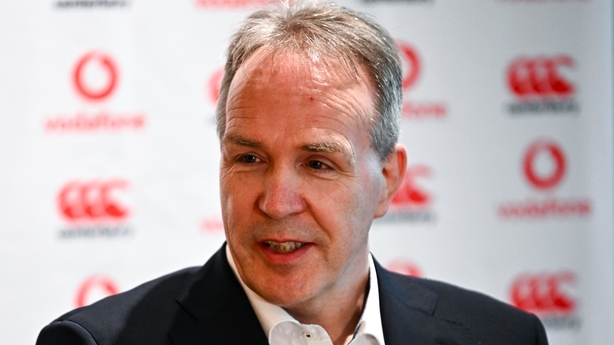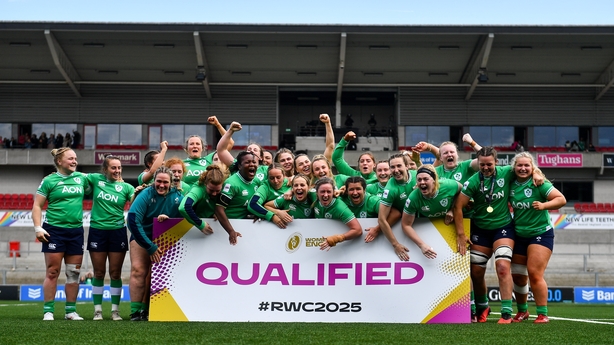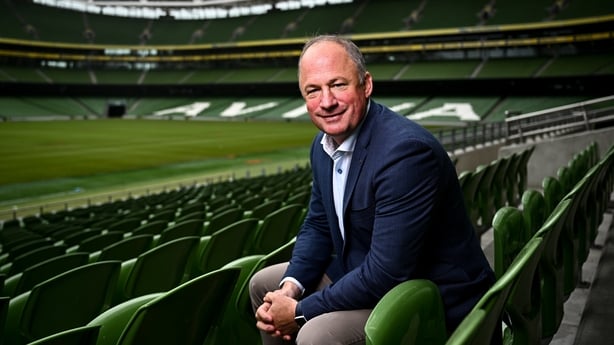The Irish Rugby Football Union hopes to appoint a 'Women's Strategy Implementation Lead' by the end of the year, with chief executive Kevin Potts seeing the women's game as the largest opportunity for growth in Irish rugby.
The IRFU launched their strategic plan for the next four years at the Aviva Stadium, with the women's game being identified as a priority between now and 2028.
Having declined rapidly between 2015 and 2023, Ireland's women's XV's game has seen an upturn in fortunes this season, with Scott Bemand's side securing a third-place finish in the Guinness Six Nations, securing early qualification for next year's World Cup in England, as well as a place in the top tier of the WXV later this year.
"We are going to recruit a senior women's lead that reports directly to me, to bring all of the strands of the women’s game together," Potts said.
"He or she will work alongside Dave [Humphreys, high performance director], Collie [McEntee, IRFU rugby development director] and Padraig [Power, chief commercial officer] and bring all the strands [together] and run it, not like a separate unit because we want to be fully integrated, but to ensure that all the strands are coming together that are set out here and reporting to me that they are on track. It needs that coordinated focus."
The IRFU CEO (below) says he expects to have the new role filled by the end of the year.

"We will be advertising for it at the end of the summer so it will be a Q4 appointment, and we want to get somebody who fits the bill for this position, it is really important to us.
"I have always had in my head a Q4 appointment, which will give a good run in to the Women's Rugby World Cup next year."
The 2024 Women's Six Nations was successful both on and off the pitch for the IRFU, with record attendances set across the three home games against Italy, Wales and Scotland, while the union says each game also made a "small profit", according to Potts.
And while the prospect of the Irish women's team filling out the Aviva Stadium is still a long way away, he believes that day will come.
"I had that discussion with the players last October and there will come a point in the journey where they will want to play in the Aviva Stadium when they have a big crowd, and if the fans get behind the team, really get behind the team in the next number of years, and we can get big numbers at the stadium, that's when the players want to play and they can play.
"In England, where obviously they are far more advanced that we are in terms of their structures and competitions, they're getting big crowds at their games.
"We're engaging with potential sponsors all the time, there's greater interest, and the numbers of girls and women that are turning up at our mini-rugby and play rugby programmes is phenomenal.

"I think, without doubt, it's a true area for growth, and we in the IRFU and the provinces are committed to really giving it a boost over the next four years.
"I also think the Rugby World Cup next year in England will have a real defining moment for women's rugby. I recall looking at the FIFA Women's World Cup around eight years ago, that was a moment where the soccer really took a step forward.
"Next year in England, full stadia for most of the games, and huge increase around the world from sponsors and partners, potentially, will give women's rugby the boost we think it will get. We are definitely committed to building on that," he added.
The IRFU's previous strategic plan, 2018-2023, put forward a series of defined 'performance targets' in both the men's and women's game.
Some of those targets were met, such as winning two or more men's Six Nations, two or more Pro14 (now URC) titles, and qualification for the men's Olympic Sevens in 2020. Several other targets were missed by a considerable distance, particularly in the women's game where the IRFU's stated aim was to finish in the top six of the 2021 Rugby World Cup, winning one Six Nations title, and reaching a semi-final at the men's Rugby World Cup.
The 2024-2028 plan makes no such projections around specific performance targets for their national and provincial sides.
David Humphreys, who has recently taken over from David Nucifora as the IRFU performance director, has defended that choice.
"Coming in from the outside, it's taking the view that without wanting to repeat myself, I was very strong in terms of not having really specific KPIs [key performance indicators]," Humphreys (below) said.

"Why I say that is, one of the things you'll hear, and it's a bit of a cliché in sport, you talk about a player leaving the jersey in a better place or someone who's in a role moving onto a different organisation and leaving it in a better place.
"If you look at the 2018 to 2023 strategic plan and what was set out there, I don't think any of us would sit here and say that Irish rugby isn't in a better place today than it was at the beginning of 2018, regardless of what we have and haven't won, so that's a very important part of it.
"But I also have a really strong view that high performance can't stand alone. The success of this strategic plan won't be on what we achieve on high performance but it's about making sure that the game in Ireland benefits from what we're going to do right across the strategic plan.
"I've deliberately come in without any pre-conceived ideas, but very much with a view that I'm incredibly passionate about building on the success there's been, very passionate about Irish rugby continuing to compete, both at provincial, but particularly at national level."
Reflecting on the 2018-2023 report, Potts said the union have learned lessons.
"There are expectations, as David [Humphreys] has said, on the high-performance side of winning.
"We don't need to tell everybody that we want to win and our teams are going out to win. I think in our last plan, we got hung up on lots of numbers and this time it's about setting out the hows and the whats and the outcomes if everything is being done well.
"Behind the plans, there are annual KPIs that will be set and we will be publishing on an annual basis so people can see the direction of travel but our expectation on the high-performance side is that we win. We don't need to say that, do we?" he added.
Listen to the RTÉ Rugby podcast on Apple Podcasts, Spotify or wherever you get your podcasts.
Watch the URC semi-final, Bulls v Leinster, on Saturday from 2.30pm on RTÉ One and RTÉ Player,
Listen to live commentary of Bulls v Leinster, and Munster v Glasgow Warriors on Saturday Sport on RTÉ Radio 1, and follow a live blog on rte.ie/sport and the RTÉ News app.


